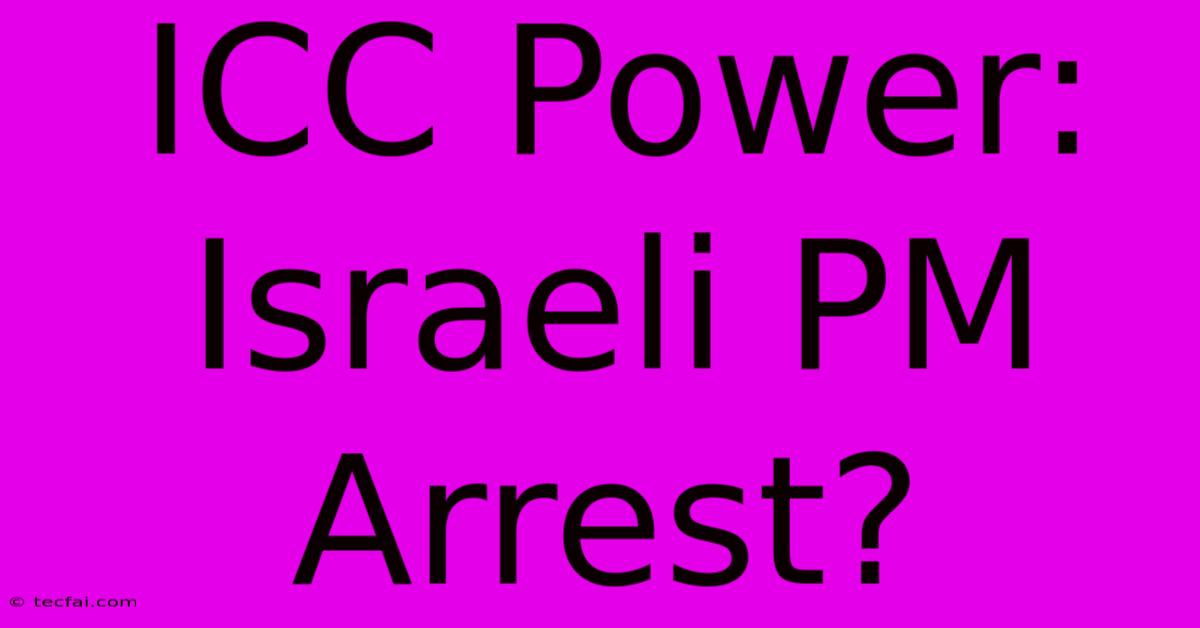ICC Power: Israeli PM Arrest?

Discover more detailed and exciting information on our website. Click the link below to start your adventure: Visit Best Website tecfai.com. Don't miss out!
Table of Contents
ICC Power: Israeli PM Arrest? A Deep Dive into International Criminal Law and Geopolitics
The recent developments surrounding the possibility of an Israeli Prime Minister's arrest by the International Criminal Court (ICC) have ignited a firestorm of debate, highlighting the complex interplay between international law, national sovereignty, and geopolitical realities. This article delves into the intricacies of the situation, examining the ICC's jurisdiction, the potential implications, and the broader context of the Israeli-Palestinian conflict.
Understanding the ICC's Mandate
The International Criminal Court, established in 2002, is an independent, permanent court of last resort tasked with prosecuting individuals accused of the most serious crimes of international concern: genocide, crimes against humanity, war crimes, and the crime of aggression. However, its jurisdiction is not unlimited. A state must either be a party to the Rome Statute (the treaty establishing the ICC) or accept the Court's jurisdiction in a specific case. Israel is not a party to the Rome Statute.
The Palestinian Statehood Claim and ICC Jurisdiction
The Palestinian Authority, claiming statehood despite limited international recognition, acceded to the Rome Statute in 2015. This action allowed the ICC to assert jurisdiction over alleged crimes committed within the Palestinian territories since June 13, 2014. This claim is highly contested by Israel and its allies, who argue that the Palestinian Authority lacks the attributes of a sovereign state under international law and therefore cannot confer jurisdiction on the ICC.
The Investigation and Potential Charges
The ICC's investigation into alleged war crimes and crimes against humanity in the Palestinian territories is ongoing. While the specifics of any potential charges against an Israeli Prime Minister remain confidential at this stage, the investigation encompasses a wide range of actions, potentially including settlement construction, military operations, and the blockade of Gaza. The focus remains on whether sufficient evidence exists to prove individual criminal responsibility for these alleged offenses, a high legal threshold.
Geopolitical Implications and International Reactions
The potential arrest of an Israeli Prime Minister would have profound geopolitical implications. It could severely strain relations between Israel and the international community, potentially escalating regional tensions and impacting the already fragile peace process. The reaction from Israel has been strongly condemnatory, with claims that the ICC is biased and politically motivated. Meanwhile, many other states, including several in the European Union, have expressed support for the ICC's mandate and ongoing investigation. This diverse range of responses highlights the deeply divided global opinion on this issue.
Challenges to ICC Authority and the Future of International Criminal Justice
The ICC faces ongoing challenges to its legitimacy and authority, particularly from states that see its actions as an infringement on national sovereignty. The situation concerning Israel underscores these challenges, exposing the inherent tensions between the desire for international accountability for serious crimes and the principle of state sovereignty. The outcome of the ICC's investigations will significantly impact not only the Israeli-Palestinian conflict but also the future of international criminal justice and the efficacy of international courts. The debate promises to be protracted and highly contentious, involving legal battles, political maneuvering, and widespread international discourse for years to come.
Conclusion: A Complex and Evolving Situation
The possibility of an Israeli Prime Minister's arrest by the ICC is a highly complex and evolving situation. The legal arguments, geopolitical ramifications, and international reactions all contribute to a landscape of considerable uncertainty. While the ICC's investigation proceeds, the world watches as a critical juncture in international law and the Israeli-Palestinian conflict unfolds. The ultimate outcome will shape the future of international criminal justice and the relationship between the ICC and states, particularly those with significant geopolitical influence.

Thank you for visiting our website wich cover about ICC Power: Israeli PM Arrest?. We hope the information provided has been useful to you. Feel free to contact us if you have any questions or need further assistance. See you next time and dont miss to bookmark.
Featured Posts
-
Why Did Snowflake Stock Increase Today
Nov 22, 2024
-
Why Rooney Wont Watch Coleen
Nov 22, 2024
-
Kohlis Attitude Bgt 2024 25
Nov 22, 2024
-
Junior Golf Dubai Desert Classic Entry
Nov 22, 2024
-
Jonathan Toews India Health Journey
Nov 22, 2024
